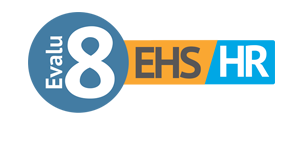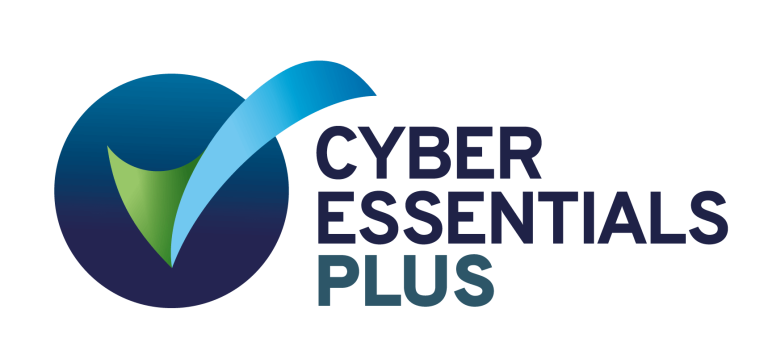
For many UK SMEs, BambooHR has become a go-to HR platform, offering simple tools to manage employee records, absence, and performance. But while BambooHR is well known, it’s not always the best fit for businesses operating under UK employment law and compliance standards. From payroll integration and rota scheduling to GDPR tracking and localised support, UK companies often find themselves needing more than BambooHR can offer out of the box.
In this article, we compare eight of the best BambooHR alternatives for UK SMEs: Evalu-8 HR, CharlieHR, HiBob, Breathe HR, Zoho People, Ciphr, Sage HR, and Employment Hero. We look at how each platform stacks up for SMEs when it comes to features, compliance, pricing, and scalability, and highlight which solution may be the right fit for your business.
Helpful summary
Overview: This article reviews eight BambooHR alternatives, analysing how each platform supports UK SMEs with HR, payroll, compliance, and workforce management.
Why Trust Us: Evalu-8 HR is a UK-built HR platform designed with SMEs in mind. It combines HR, payroll exports, rota scheduling, time & attendance, and compliance tracking in one system, giving businesses the tools they need to stay efficient and compliant without relying on third-party add-ons.
Why It Matters: Many HR platforms were built outside the UK and don’t fully address UK employment law, GDPR, or payroll requirements. Choosing the right system can save SMEs significant time and cost, while ensuring compliance and reducing reliance on spreadsheets or bolt-on apps.
8 Best BambooHR Alternatives for UK SMEs in 2025
1. Evalu-8 HR: Best All-in-One BambooHR Alternative

Why Evalu-8 HR Stands Out
Evalu-8 HR is designed specifically for UK SMEs that want an all-in-one HR and compliance solution without the cost or hassle of third-party add-ons. Unlike BambooHR, which often relies on integrations for payroll and compliance, Evalu-8 HR includes everything in one platform. Its modular design means businesses can start with core HR and add features like rotas, time & attendance, or fatigue management as they grow. With compliance built around UK employment law and GDPR, it’s a solution that scales with your business while staying legally watertight.
Core Features
Centralised HR database: Maintain a single source of truth for employee records, including contracts, performance reviews, right-to-work documents, and absence history.
Absence and holiday management: Track leave requests, sickness, and statutory entitlements with automated approvals and calendar views for managers and staff.
Payroll support: Export payroll data in formats ready for Sage, Xero, and other UK payroll systems, cutting down manual processing time.
Time & attendance tracking: Employees can clock in via mobile app, desktop, or on-site terminal. GPS and IP-restricted clock-ins prevent “buddy punching” or false check-ins.
Rota management (optional add-on): Drag-and-drop shift templates, rolling patterns, and conflict alerts help managers build reliable rotas for multiple locations.
Compliance hub: Store and monitor right-to-work checks, GDPR consents, health & safety reporting, and training records.
Customisable reporting: Real-time dashboards showing headcount, absence rates, overtime costs, and compliance status with export options for HR audits.
Advanced Features
Automated timesheets: Clock-in data flows directly into timesheets, matched against contracts and working time regulations for accurate payroll approval.
Shift conflict prevention: System alerts managers if a shift assignment overlaps with leave, other bookings, or breaches working hour limits.
Contractor & volunteer profiles: Create simplified profiles for non-permanent staff so they can be included in rotas and compliance checks without full employee overhead.
Performance and appraisal tracking: Build in regular review cycles, capture manager and employee feedback, and track objectives in one place.
Document management & e-signatures: Upload contracts, policies, and health & safety documents for digital acknowledgement and sign-off.
GDPR & data security tools: Audit trails, access restrictions, and data expiry alerts help SMEs stay compliant with GDPR requirements.
Fatigue management module: Track working patterns against fatigue risk thresholds, especially valuable for sectors like healthcare, manufacturing, and security.
Scalable design: Start with HR basics and add modules like Rota, T&A, or full EHS compliance as your business grows, without migrating systems.
Pricing
Core HR: £2.50 per user/month
Rota Management: £1.45 per user/month
Time & Attendance: £2.50 per user/month
Other modules (EHS, fatigue, contractor portal, etc.): Priced individually — pay only for what you need
Setup fee: One-off onboarding and training cost, scaled to business size
Explore Evalu-8 HR
Pros & Cons
Pros
- Built for UK SMEs with UK law and GDPR at the core
- Modular pricing keeps costs low, scale as you need
- Combines HR, payroll, rotas, compliance, and safety in one place
- Powerful fatigue and rota management tools are not common in HR platforms
- Strong audit and compliance reporting for managers
Cons
- Less global brand recognition compared to BambooHR or Factorial
- Interface is functional rather than “slick”
Why Evalu-8 HR is a Better Choice
Unlike BambooHR, Evalu-8 HR provides compliance tracking, payroll exports, and volunteer management in one platform. It’s also UK-focused, meaning it adheres to UK employment laws and GDPR better than US-based competitors.
Best for: UK businesses looking for an all-in-one HR system that eliminates the need for third-party software.
2. CharlieHR

CharlieHR is positioned as a simple, lightweight HR platform for small businesses. It aims to reduce admin by automating holiday booking, onboarding, and performance reviews. Its clean interface and user-friendly design appeal to teams that want a quick, out-of-the-box solution without heavy configuration.
However, while CharlieHR works well for very small teams, it lacks depth in areas like payroll, advanced compliance, and modular add-ons. For UK SMEs with more complex requirements (e.g. shift management, time tracking, or safety compliance), the platform often requires manual workarounds or external tools.
Core Features
Central employee records: Store basic HR data, contracts, and documents in one place with simple search functionality.
Holiday & absence management: Staff can request leave via the system, with approvals routed to managers and calendars updated automatically.
Onboarding tools: Digital checklists help managers guide new starters through tasks such as document uploads, induction training, and equipment assignment.
Performance reviews: Built-in tools to schedule reviews, collect feedback, and set goals.
Basic reporting: Download absence data, headcount, and performance review status to help managers track HR processes.
Employee self-service: Employees can manage their personal data, view policies, and track leave balances without relying on HR.
Advanced Features
Custom workflows: Build simple automation for processes like approvals, onboarding, or probation tracking, though these lack the depth of enterprise-grade workflow tools.
Perks & benefits marketplace: Access third-party employee perks and discounts, but often at an additional cost.
HR compliance basics: Store right-to-work documents and track policy acknowledgements, though reporting and auditing are less robust compared to other UK-focused systems.
API and integrations: Connect with some payroll and productivity tools, but integrations are limited compared to broader HR suites.
Engagement surveys: Run basic employee surveys, though analysis tools are fairly lightweight.
Custom branding: Add company logos and colours for a more branded employee experience.
Pricing
Core HR platform: From £5 per employee/month
Perks & benefits add-ons: Priced separately
No built-in payroll module integrations or external systems required
Free 14-day trial available
Pros & Cons
Pros
- Simple, clean, and user-friendly interface
- Quick to set up for small teams with limited HR complexity
- Useful onboarding and review tools built in
- Affordable for startups or very small businesses
Cons
- Lacks built-in payroll must use third-party integrations
- Limited compliance functionality compared to UK-specific platforms
- Weak in time & attendance, rota management, and safety features
- Reporting and analytics are basic
- Not scalable for businesses with complex or multi-site needs
3. HiBob

HiBob, often branded simply as “Bob,” is a modern HR platform designed for fast-growing companies with international teams. Its standout feature is employee experience: strong onboarding, engagement tools, and a highly customisable interface. Many mid-sized organisations choose HiBob for its polished look and global HR functionality.
That said, HiBob is often more than UK SMEs need. Its pricing reflects a focus on scale-ups and enterprises rather than small domestic businesses. While it delivers breadth across HR functions, payroll, and compliance often require integrations, and the system can feel overengineered for smaller companies with straightforward HR needs.
Core Features
Centralised HRIS: Manage employee profiles, documents, contracts, and lifecycle events in one central hub.
Onboarding & offboarding workflows: Automate tasks for new hires or leavers, including document signing, system access, and manager checklists.
Time off & absence management: Configurable policies for holiday, sickness, parental leave, and local entitlements across multiple regions.
Performance management: Structured review cycles, feedback tools, and OKR (objectives and key results) tracking built into the platform.
Engagement surveys & polls: In-platform surveys with anonymous responses to track employee sentiment and culture trends.
Employee directory & org charts: Visual overview of reporting lines, departments, and global teams.
Customisable reporting & dashboards: Export data or create dashboards on headcount, attrition, and engagement trends.
Advanced Features
Compensation management: Tools for salary benchmarking, pay rises, and equity planning, targeted at larger businesses with complex pay structures.
Custom workflows & automation: Build multi-step approval flows and process automations tailored to your organisation.
HR compliance tools: Store right-to-work and visa data, though advanced compliance reporting is lighter compared to UK-focused vendors.
Integrations marketplace: Wide range of integrations with payroll, benefits, collaboration, and ATS systems, but often essential to fill gaps.
Employee engagement focus: Slack/Teams integrations, recognition tools, and a strong emphasis on employee culture-building.
Multi-country support: Handles region-specific holiday rules and currencies for organisations operating across borders.
API & customisation: Flexible API for companies wanting to build bespoke connections to other systems.
Pricing
Pricing is quote-based and varies depending on company size and required modules.
Typically reported at £6–£12 per employee/month, putting it on the higher end compared to SME-focused platforms.
No free tier, targeted at mid-market and enterprise.
Pros & Cons
Pros
- Strong employee engagement, culture, and onboarding tools
- Highly customisable workflows and reporting
- Designed for companies with international or scaling needs
- Modern, polished user experience that staff tend to adopt quickly
- Wide integration options with third-party systems
Cons
- Pricing is significantly higher than SME-focused competitors
- Lacks native payroll integrations are a must
- Compliance reporting less robust for UK-specific needs (e.g. GDPR, right-to-work checks)
- Overly complex for small domestic businesses with straightforward HR requirements
- Add-ons and integrations can increase cost and reliance on third parties
4. BreatheHR
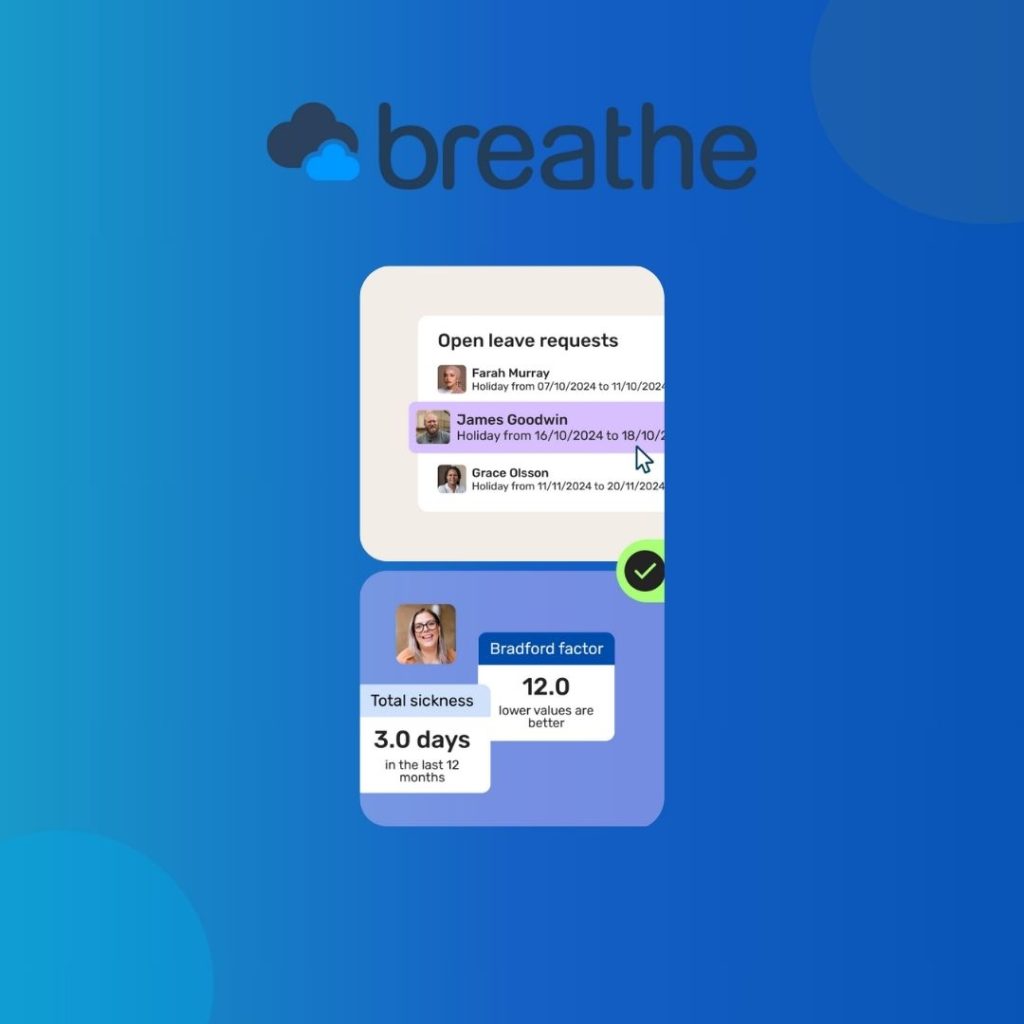
BreatheHR has built a strong reputation in the UK as a simple, affordable HR platform for small businesses. Its clean interface and focus on core HR tasks like absence tracking, employee records, and document management make it a popular first step away from spreadsheets. It’s easy to set up, requires little training, and is priced to be attractive for micro-businesses.
However, while Breathe HR works well for very small teams, it shows limitations as businesses grow. It doesn’t include native payroll, rota management, or time & attendance, meaning companies often have to bolt on extra systems or revert to manual workarounds. For SMEs with more than 25–30 staff, these gaps can become major pain points.
Core Features
Central employee records: Store contracts, personal details, emergency contacts, and policy documents in a secure online system.
Absence & holiday management: Staff request time off through the portal; managers approve, and calendars update automatically.
Performance management: Log 1-to-1 meetings, set objectives, and track appraisals in the system.
Document storage & e-signatures: Upload contracts, policies, or handbooks, with options for staff to acknowledge or sign digitally.
Employee self-service: Staff can update personal details, check holiday balances, and download documents without going through HR.
Basic reporting: Export HR data like absence records, headcount, and document acknowledgements for compliance and audits.
Advanced Features
Recruitment add-on: Basic applicant tracking to manage vacancies, applications, and candidate communication.
Expenses add-on: Submit, approve, and track expenses digitally, but without deep finance system integration.
Learning & development add-on: Manage training logs and assign courses, though functionality is lighter than dedicated LMS platforms.
API & integrations: Limited connections to payroll and finance tools, but not as extensive as larger HR systems.
Custom permissions: Set different access levels for managers, admins, and employees, but controls are fairly high level.
Partner network: Access HR consultants and partner services via Breathe’s extended network.
Pricing
Core HR system: Starts at £18/month for up to 10 employees, then scales based on headcount (e.g. £151/month for 100 staff).
Add-ons (Recruitment, L&D, Expenses): Priced separately, increasing total cost if you need more than basic HR.
No per-user pricing model based on bands of employee numbers.
Pros & Cons
Pros
- Affordable and simple for very small businesses
- Quick to set up with minimal training needed
- Clean, easy-to-navigate interface
- Flexible add-ons for recruitment, expenses, and L&D
- Trusted brand with strong UK SME presence
Cons
- Lacks native payroll integrations are a must
- No rota or shift management features
- Reporting and compliance tools are basic
- Add-ons quickly increase cost as needs grow
- Not scalable for SMEs with 50+ employees or complex HR structures
5. Zoho People
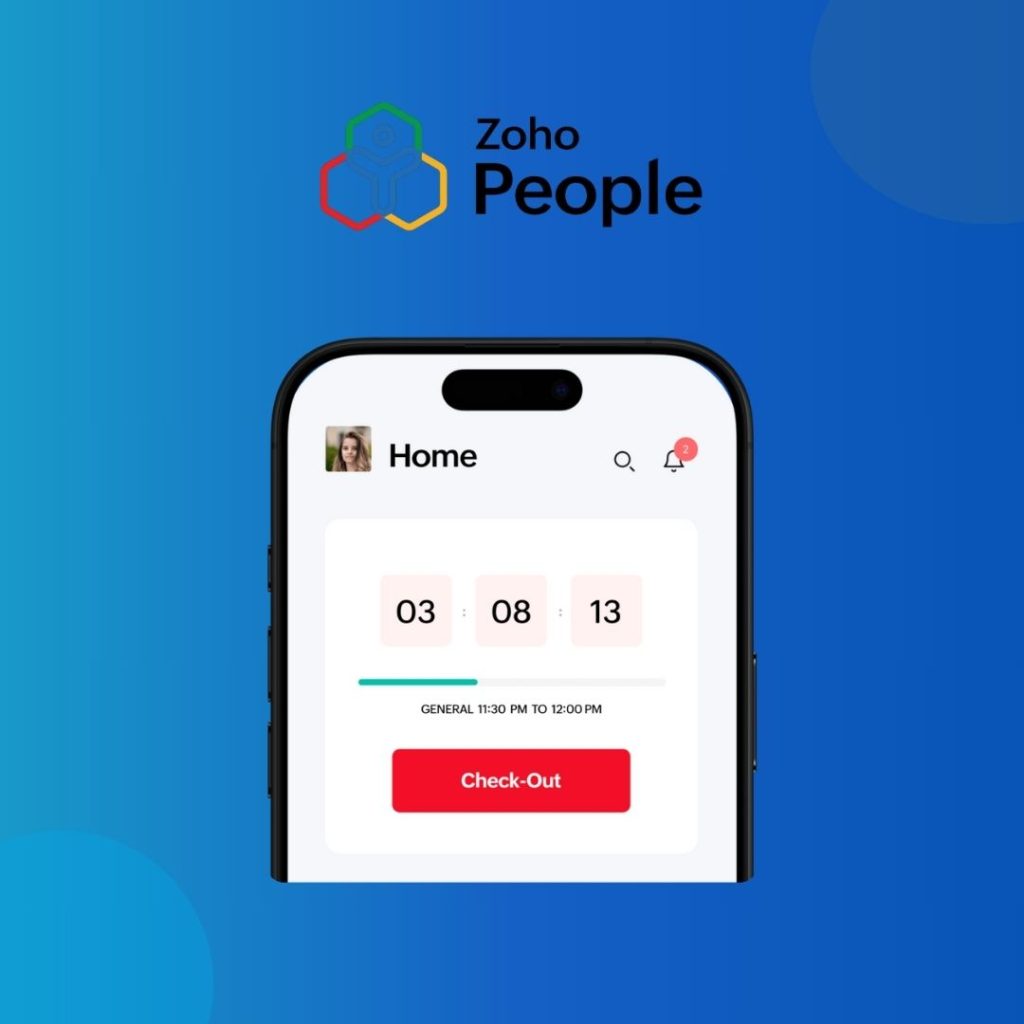
Zoho People is part of the wider Zoho suite, which includes finance, CRM, and productivity apps. For businesses already using Zoho products, People integrates seamlessly and offers a wide range of HR functions from attendance tracking to performance management. Its flexibility and automation make it attractive for companies wanting a system that can be adapted to unique processes.
That said, Zoho People is built for a global audience, not specifically for the UK market. Payroll isn’t native, compliance tools aren’t tailored to UK law, and the system can feel complex for SMEs that just want a straightforward HR platform. It’s most valuable when used as part of the wider Zoho ecosystem, but less compelling as a standalone HR tool for UK SMEs.
Core Features
Employee database: Maintain a single system of record for employee information, contracts, emergency contacts, and history.
Time off management: Customisable leave policies, automated accruals, and manager approvals with calendar syncing.
Attendance tracking: Clock-ins via web, mobile, or biometric devices, with support for multiple locations.
Shift scheduling: Assign shifts and track attendance, though functionality is more basic than specialist rota tools.
Performance management: Supports KRAs (Key Result Areas), competencies, and performance appraisals.
Employee self-service: Staff can apply for leave, update records, and access company documents from the portal or mobile app.
Document management: Upload and share contracts, policies, or employee handbooks, with role-based access.
Advanced Features
Workflow automation: Build customised HR workflows (e.g., approvals, notifications, onboarding steps) with no coding required.
Custom forms & fields: Create bespoke data fields and forms to capture industry-specific HR data.
Integrations with Zoho ecosystem: Direct links with Zoho Books (finance), Zoho Payroll (limited to certain regions), Zoho CRM, and third-party apps.
Learning management system (LMS): Assign courses, track completions, and log training hours.
Case management: Employees can raise HR queries (like a helpdesk), with tracking and resolution tools.
Mobile app: Full-featured app for attendance, approvals, and document access.
Analytics & reporting: Custom dashboards with metrics across HR operations, though compliance reporting is not UK-specific.
Pricing
Free plan: Up to 5 users (basic HR only).
Paid tiers: Start from around £0.80 per employee/month (Essential HR) to £4–£7 per employee/month for advanced modules like performance and case management.
Add-ons: Learning management and advanced features may carry additional charges.
Payroll: Only supported in a few countries, not available for UK users.
Pros & Cons
Pros
- Wide feature set covering most HR basics and beyond
- Very affordable entry-level pricing
- Strong workflow automation and customisation options
- Integrates well with Zoho’s wider business software
- Good mobile functionality for managers and staff
Cons
- Not UK-specific, no native payroll or tailored compliance tools
- Complexity can overwhelm smaller businesses that just need core HR
- Works best if you’re already using other Zoho products
- Support and documentation can be patchy outside core regions
- Limited scalability for SMEs that want deep rota, fatigue, or safety management
6. Ciphr
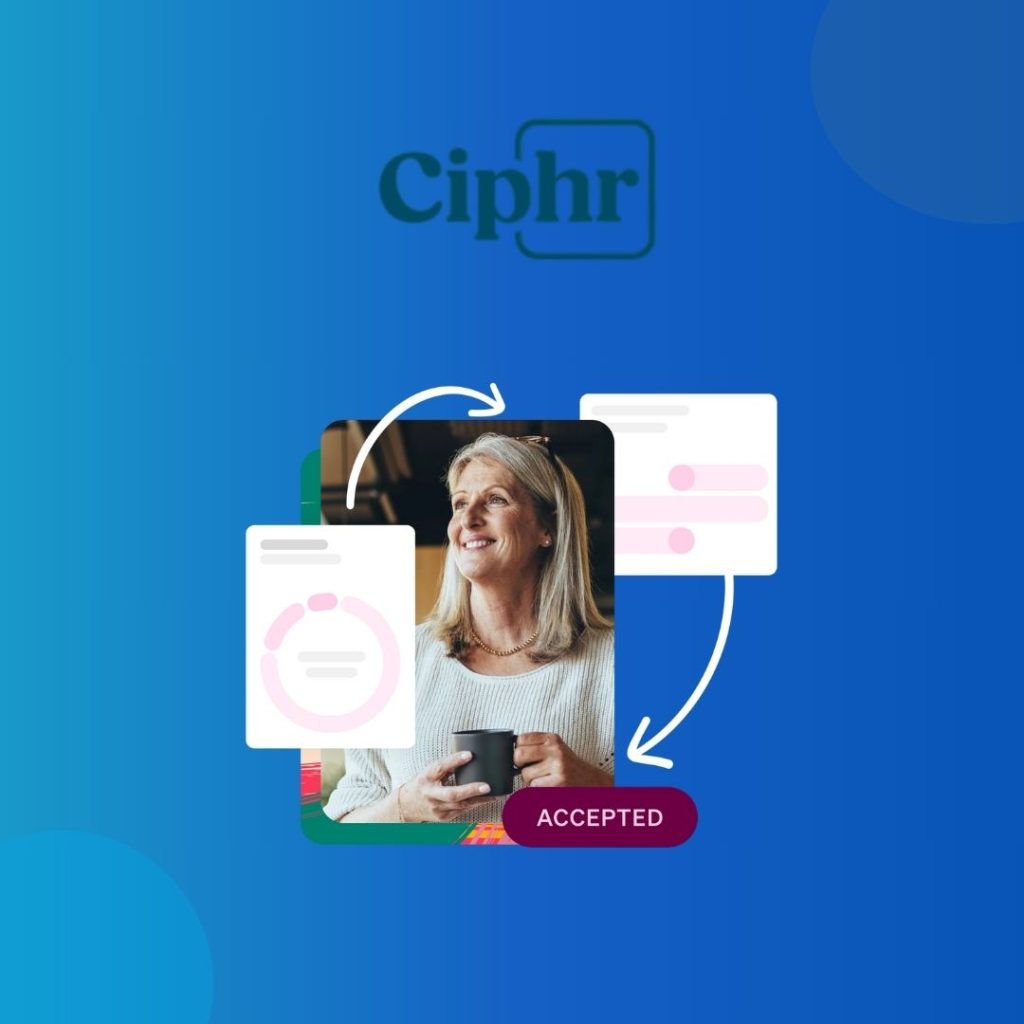
Ciphr is a UK-based HR software provider aimed at mid-sized to larger organisations. It positions itself as a comprehensive HR suite with strong modules for recruitment, learning, and payroll. Its reputation in the UK market is solid, and it’s often chosen by businesses that want a more established vendor with broader HR coverage.
However, Ciphr’s platform is better suited to larger organisations with HR teams to manage it. The interface is not as user-friendly as newer SaaS competitors, setup costs are higher, and the system can feel heavy for SMEs that want speed, affordability, and simplicity.
Core Features
HR management: Store and manage employee records, contracts, documents, and compliance details.
Absence & holiday tracking: Staff request leave through the system with manager approvals and reporting built in.
Payroll: Integrated payroll available (via Ciphr’s own module or through partnerships), providing a more “complete” HR suite than some competitors.
Recruitment (Ciphr iRecruit): Applicant tracking, vacancy advertising, and candidate communication.
L&D management: Training logs, course assignments, and e-learning capabilities.
Performance management: Appraisal tracking, feedback tools, and goal-setting within the platform.
Reporting & analytics: Wide range of standard HR reports, plus custom reporting options.
Advanced features
Payroll bureau service: Option to fully outsource payroll to Ciphr’s managed services.
Integrated modules: Recruitment, learning, payroll, and HR data all connected in one suite.
Onboarding workflows: Automate new starter tasks with digital checklists and document collection.
Customisable dashboards: Role-specific views for managers, HR, and employees.
Compliance support: Track mandatory training, right-to-work documentation, and policy acknowledgements.
API & integrations: Connect with some finance and productivity systems, though the marketplace is not as wide as global competitors.
Optional managed services: Outsource HR or payroll functions directly to Ciphr’s team.
Pricing
Ciphr does not publish transparent pricing, all quotes are tailored.
Typically positioned at the higher end of the market with setup fees and ongoing licence costs.
Often more expensive than SME-focused platforms like Evalu-8, Breathe HR, or Factorial.
Pros & Cons
Pros
- Established UK provider with strong compliance focus
- Integrated payroll option is a plus for companies that want everything in one suite
- Wide range of HR modules including recruitment and learning
- Optional managed services reduce admin burden
- Strong reputation with mid-market companies
Cons
- Higher cost than SME-focused alternatives
- Complexity Interface is dated compared to modern SaaS competitorscan overwhelm smaller businesses that just need core HR
- Implementation can be complex and time-consuming
- Overkill for small businesses with straightforward HR needs
- Limited flexibility, better suited to larger organisations with dedicated HR teams
7. Sage HR

Sage HR is part of the wider Sage business software ecosystem, giving it strong appeal for companies already using Sage payroll or accounting. It combines core HR functions with optional add-ons like performance, recruitment, and shift scheduling. Its main advantage is the direct integration with Sage Payroll, making it a logical choice for SMEs already tied into Sage’s finance products.
That said, Sage HR can feel less intuitive than newer SME-first systems. While the feature set is broad, usability is sometimes clunky, integrations outside of Sage are limited, and the cost rises quickly as you add modules.
Core Features
Employee records: Store contracts, personal details, emergency contacts, and performance notes in one central hub.
Leave & absence management: Employees can request holidays, sick leave, or other absences with automated approvals and reporting.
Payroll integration: Direct connection to Sage Payroll ensures smooth data flow, reducing errors and duplication.
Shift scheduling (Rota): Build and publish schedules, notify staff of changes, and manage shift swaps.
Time & attendance tracking: Clock in via mobile, desktop, or tablet kiosk, with data flowing directly into timesheets.
Performance management: Supports goal-setting, 360° feedback, and appraisal cycles.
Recruitment module: Manage vacancies, track applicants, and move candidates through stages.
Self-service portal: Employees can update records, view payslips (if integrated with payroll), and check schedules.
Advanced Features
Expense management: Submit, approve, and track expenses digitally with receipts uploaded via mobile app.
Custom workflows: Automate HR processes like onboarding tasks, policy acknowledgements, or approval chains.
Reporting & analytics: Create HR dashboards with headcount, absence trends, and payroll data when integrated.
Mobile app: Full-featured iOS/Android app for leave requests, clocking in/out, and accessing schedules.
Document management: Store and share policies, contracts, and health & safety information with e-signatures.
Integration with wider Sage ecosystem: Works best when paired with Sage Payroll and Accounting, but less flexible with external tools.
Multi-location support: Track staff across multiple sites or departments, useful for retail, hospitality, and field-based teams.
Pricing
Pricing is module-based; each function (HR, Rota, Expenses, Performance, Recruitment) carries a per-employee/month cost.
Entry pricing is typically around £4–£6 per employee/month, rising as modules are added.
Integration with Sage Payroll is a separate subscription cost.
No transparent “all-in” bundle for SMEs, you pay per module.
Pros & Cons
Pros
- Strong payroll integration if already using Sage
- Broad range of HR modules including recruitment, performance, and expenses
- Trusted UK brand with long history in payroll/accounting
- Mobile app covers most key HR functions
- Useful for multi-site scheduling and T&A
Cons
- Pricing adds up quickly as modules are bolted on
- Less intuitive interface compared to newer SME-first tools
- Limited flexibility with non-Sage integrations
- Overkill for very small businesses; better suited to mid-sized companies
- Can feel disjointed compared to truly all-in-one modular platforms like Evalu-8
8. Employment Hero
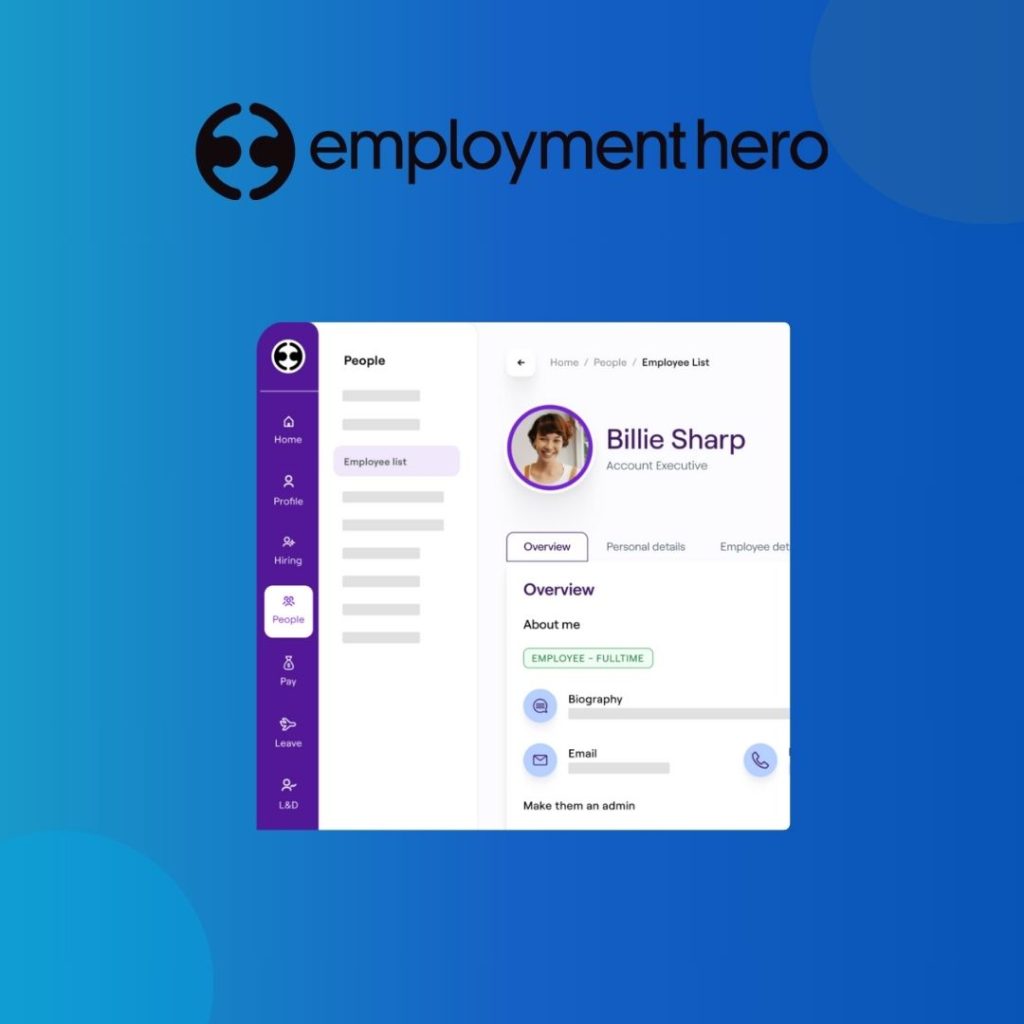
Employment Hero is an Australian-born platform that has expanded into the UK and beyond. It markets itself as an all-in-one HR, payroll, and benefits platform with a heavy focus on employee experience and perks. Its strengths lie in combining core HR tools with extras like employee discounts, mental health support, and benefits management.
While Employment Hero can be attractive for companies wanting to bundle HR with staff engagement and perks, it isn’t always the best fit for UK SMEs. Payroll integrations can be patchy, compliance isn’t tailored to UK law in the same way as UK-built systems, and pricing often ends up higher once perks and add-ons are factored in.
Core Features
Employee records: Store contracts, emergency contacts, training history, and HR documents.
Leave management: Staff request and approve holiday or absence through the app, with calendars updated automatically.
Onboarding workflows: Digital induction checklists, contract e-signing, and welcome packs for new hires.
Performance management: Goal-setting, feedback tools, and appraisal cycles.
Policy acknowledgements: Upload company policies and track which staff have read and signed them.
Employee self-service: Mobile and desktop access for staff to update details, request leave, or check payslips.
Basic reporting: Absence, headcount, and payroll reporting to support HR audits.
Advanced Features
Integrated payroll: Native payroll is stronger in Australia; UK businesses rely on third-party integrations.
Benefits & perks platform: Employee discounts, wellbeing support, and reward schemes to boost engagement.
Learning management system (LMS): Assign training courses, track completion, and monitor CPD hours.
Global compliance support: Tools for managing HR across multiple countries, though UK-specific compliance is lighter.
Recruitment & ATS: Advertise roles, track applicants, and manage candidate communication.
Engagement surveys: Run employee polls and engagement surveys, with analysis dashboards.
Mobile app: Full-featured app for staff to check payslips, access perks, and log leave.
Pricing
Core HR: From around £4–£6 per employee/month, scaling with modules.
Perks & benefits: Priced as an additional tier, not included in base HR.
Payroll: Native for AU/NZ, but UK businesses must integrate with compatible providers.
Quote-based pricing for larger organisations.
Pros & Cons
Pros
- Combines HR with employee benefits and perks
- Strong focus on engagement and wellbeing
- Mobile app is highly polished and user-friendly
- Offers an integrated LMS and recruitment tools
- Attractive for companies with a younger workforce who value perks
Cons
- Payroll, not fully native for UK user,s requires integration
- Compliance features aren’t as tailored to UK law (GDPR, right-to-work, H&S)
- Pricing increases quickly when adding perks and extras
- More focused on employee experience than deep HR compliance
- Can feel bloated for SMEs that just want simple HR, payroll, and rotas
The Right HR Software Can Transform Your Business
Making the move away from BambooHR doesn’t have to be difficult. For UK businesses that want a cost-effective, compliant, and scalable HR system, Evalu-8 HR is built with you in mind.
From payroll integration and rota management to compliance tracking and automated workflows, Evalu-8 gives you everything you need to manage people and processes in one place.
Choosing the right HR software isn’t just about cutting admin, it’s about building a platform that supports growth, protects your business, and frees your team to focus on what really matters.
Book a demo today and see how Evalu-8 HR can change the way you run HR.
FAQs: Finding the Best BambooHR Alternative
Evalu-8 HR is the best alternative for UK businesses, offering full HR management, compliance tracking, and payroll support in one platform.
CharlieHR and BreatheHR are good for micro-businesses, but Evalu-8 HR provides a more scalable solution.
Evalu-8 HR and Ciphr provide built-in compliance tracking, whereas other platforms rely on integrations.
Yes, Evalu-8 HR offers better compliance tracking, payroll integration, and cost-effective pricing for UK SMEs.
Evalu-8 HR offers flexible, budget-friendly pricing, making it affordable for UK small and medium businesses.
